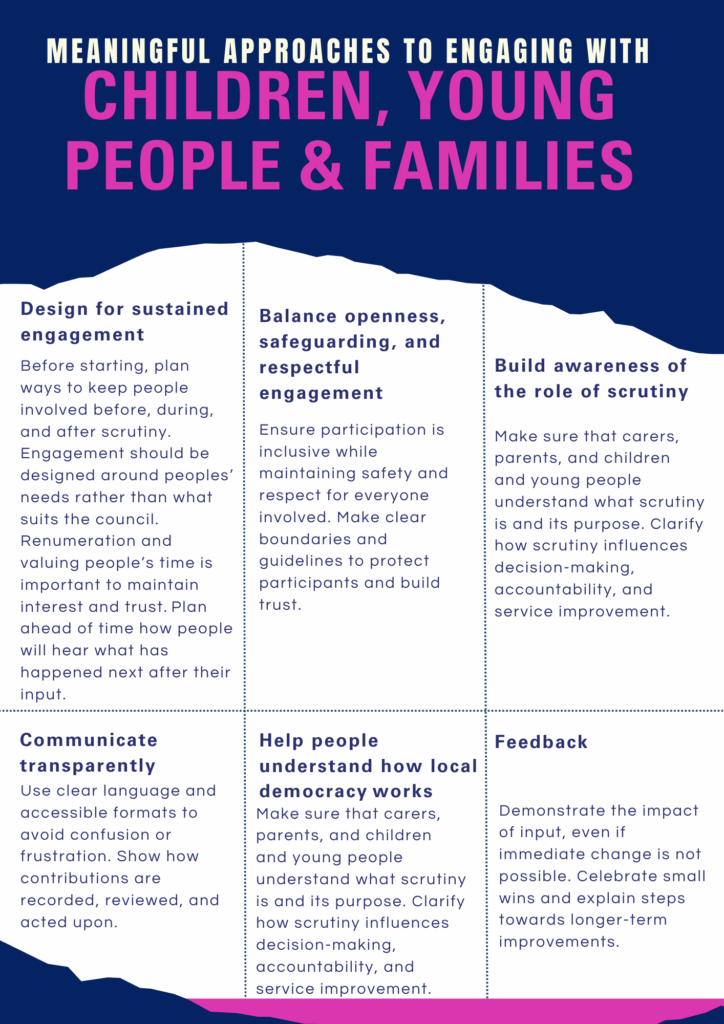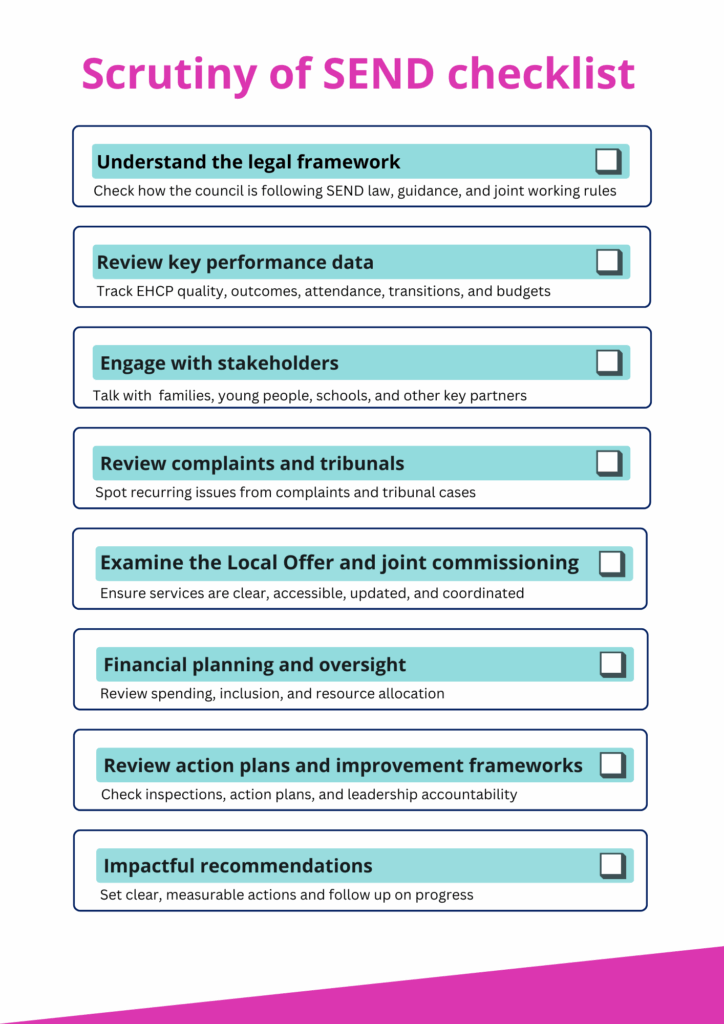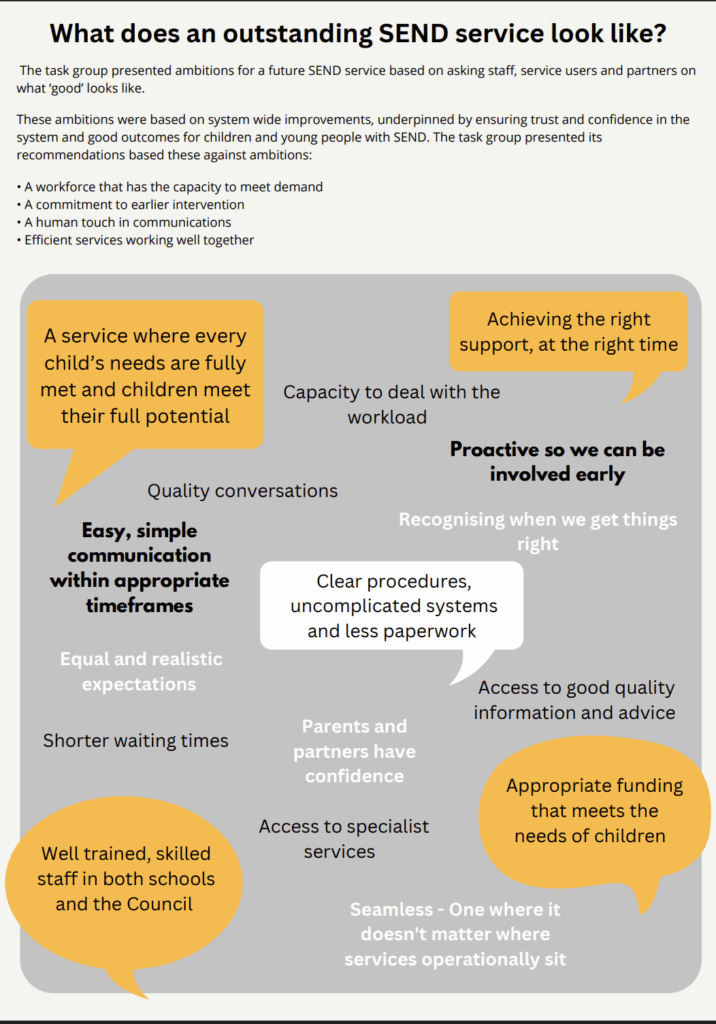Introduction
Scrutinising SEND services is one of the most complex and important areas of local government scrutiny. Families, carers, and young people often have high expectations that their lived experience will directly shape change, while members must navigate sensitive issues, shifting national frameworks, and stretched local services.
This guide brings together shared insights collected at a learning event; from councils, practitioners, and partners on what effective SEND scrutiny looks like in practice. It is designed to support scrutiny members, officers and key partners including health and education, to approach this work with confidence, clarity, and a strong focus on impact. The work of local Parent Carer Forums and the National Network of Parent Carer Forums (NNPCF) is also highlighted and acknowledged for the input to this practice guide.
Drawing on our learning event and wider sector practice, we set out why councils choose to scrutinise SEND, the challenges they face, and how scrutiny can help drive real improvements for children, young people, and families. We also look at how to engage meaningfully with lived experience, build system readiness, and equip members with the tools and techniques they need.
The guide is intended to complement existing resources (including LGA), by providing a practice-focused lens: exploring not only the “what” of SEND scrutiny but also the “how” and the “so what” of the difference it can make. Throughout, each section zooms in and out, starting broad, illustrating with practice, then extracting ideas for others to adapt.
The “Learning into Action” section directly turns the insight gathered into forward-looking steps. This is supported with practical resources to help build effectiveness and impact into SEND scrutiny.
The learning event was attended by 40 councils in total. See the full list at the end of this guide.
Why scrutinise SEND?
Scrutiny of SEND is prompted by a range of factors, including inspection outcomes, visible service failures, or concerns raised by families. Council members themselves may also rightly raise concerns about children with SEND. For example, the Children’s Scrutiny lead officer for Devon County Council shared insight about an Ofsted/CQC inspection. Four areas of significant weakness were identified here, with no progress at re-inspection. This created a tipping point where members recognised the need for a sustained and focused piece of scrutiny work.
Scrutiny in action - case study
SEND services in Cheshire West and Chester
Similarly, in Cheshire West and Chester, falling EHCP timeliness and rising parent protest prompted scrutiny to lead a review, supported by a full council motion committing the borough to becoming “inclusive and SEND friendly.”
When the Council’s Education, Health and Care Plans (EHCPs) fell below the national 20-week completion standard, families and carers amplified their concerns through the Cheshire West SEND Accountability Group. Protests and community pressure pushed the issue to the forefront.
In response, elected members committed to making the borough “inclusive and SEND Friendly.” A “Scrutiny in a Day” approach brought families, schools, and carers together, placing lived experience at the heart of the SEND Action Plan.
This case study shows how scrutiny often begins at a tipping point where service performance, public concern, and political will converge to drive real change.
Preparing for effective scrutiny
System readiness
Scrutinising SEND (Special Educational Needs and Disabilities) provision in local councils is essential for ensuring accountability, transparency, and the effective delivery of services for children and young people. Whether you are a councillor, officer, parent, or part of a scrutiny committee, preparing for a proper SEND scrutiny process requires a thorough understanding of the system and its readiness to meet statutory duties.
Checklist for undertaking scrutiny:
Define the scope of the review and whether it will focus on the whole SEND system or a specific issue. Identify what difference it is possible for scrutiny make and exactly where it has levers.
Councillors and scrutiny committees should familiarise themselves with statutory responsibilities under the Children and Families Act 2014 and the SEND Code of Practice. This includes identifying and assessing children with SEND, publishing a Local Offer, creating and reviewing Education, Health and Care Plans (EHCPs), and ensuring effective joint commissioning between education, health, and social care. Reviewing Ofsted and CQC local area SEND inspection reports provides insight into how well the system is functioning independently.
Reviewing Ofsted and CQC local area SEND inspection reports is a helpful way to see how well the system is functioning independently.
Committees should assess EHCP timeliness, quality, and educational outcomes, as well as school attendance, transitions to adulthood, parental feedback, and budget allocation for SEND services. Accessing dashboards, quarterly reports, or benchmarking data against national averages or comparable local authorities helps identify strengths, weaknesses, and areas for improvement.
Examining patterns in complaints and tribunal cases enables councillors to detect recurring issues, systemic gaps, and challenges that data alone might not reveal.
Scrutiny committees should plan for meaningful dialogue with parents and carers, young people with SEND, schools and SENCOs, health and social care professionals, and SENDIASS. Gathering their perspectives ensures scrutiny captures the lived experiences of children and families.
Committees should review whether the Local Offer is clear, accessible, co-produced with families, regularly updated, and well signposted. Scrutinising collaboration between education, health, and care services reveals how effectively decisions are integrated, whether inter-agency disagreements cause delays, and how funding is shared for joint placements or therapies. Attention should also be given to whether joint commissioning delivers high-quality, coordinated provision that meets the needs of children and young people.
Scrutiny committees should explore high needs funding, identifying drivers of overspend and assessing measures to improve value for money. Examining SEND provision allows members to see whether children’s needs are met through mainstream inclusion or specialist provision, including reviewing suspension and exclusion rates, the support available for inclusive schools, and efforts to expand inclusive placements locally.
Scrutiny committees should examine whether the area has undergone a SEND inspection and review Written Statements of Action, progress updates, and independent monitoring reports. Analysis allows members to hold leadership to account, ensuring statutory duties are understood, SEND performance is transparent, and visible leadership drives improvement. Scrutiny should also examine the quality of EHCPs and the effectiveness of joint commissioning in supporting outcomes for children and young people.
Councils should summarise findings clearly and set robust recommendations. Following up in future meetings ensures accountability and tracks whether improvements are implemented successfully.
SEND scrutiny requires confidence to handle complex and sensitive issues. In Devon, members were initially dealing with repeated inspection failures and a politically charged environment. The aspirational approach helped shift their focus from “what’s gone wrong” to “what could excellence look like?”, supporting a constructive and strengths-based tone. This shows how tools like pre-meetings, structured task groups, and simple but powerful questions can strengthen member confidence and provide a framework for discussions.
Insight snapshots
Devon: Task & Finish groups, staff surveys, and external evidence kept focus sharp. Simple framing question — “What would an outstanding service look like?” – shifted debate from blame to solutions.
West Sussex: Supported members with training on SEND Law, glossaries, pre-meetings, and informal briefings. Parents asked for clear, concise reporting on EHCP timeliness (whether plans were being completed within the 20-week statutory timeframe) and transparency (how decisions were made, how cases were prioritised, and what the process looked like in practice).
Outstanding SEND scrutiny
One word to describe what outstanding SEND scrutiny looks like, was compiled from CfGS learning event into a wordcloud:

Listening well
Engaging lived experience in scrutiny work
Hearing children and young people with SEND and their families is central to credible, effective. When professionals involve parents and young people, they gain a clear picture of what support is needed and how services should develop. At the same time, families learn more about the challenges and complexities professionals face when trying to make changes. By working together and sharing knowledge, everyone can find practical solutions and make the best use of limited resources to create services that truly work for them.
This direct involvement – and that of frontline staff – is essential in making scrutiny of SEND services effective. Meaningful engagement therefore requires safe, respectful spaces.
Representation has made great strides over the past few decades, though it’s still advisable to query who is on local groups, how they got appointed and how representative group members are when considering who to invite to contribute to scrutiny.
Scrutiny committees benefit from engaging with youth groups, SEND groups, and parent carer forums, as these representative voices provide valuable insight into lived experience and help identify areas for service improvement. The challenge is to strike the right balance: committees should use these perspectives to inform policy and performance discussions, without getting drawn into debating or re-litigating individual cases, particularly in public meetings. Focusing on broader themes and systemic issues ensures scrutiny remains constructive, fair, and effective while safeguarding confidentiality and maintaining trust with the community.
Young people’s groups
Many councils have youth cabinets, advisory boards, or SEND voice groups. Check your local council website, schools, colleges, or universities for opportunities to join. National charities, advocacy groups, social media, community centres, and youth clubs can also connect you with youth or SEND groups.
Parent carer forums
Parent carer forums play a vital role in ensuring genuine co-production in SEND services, bringing lived experience and solution-focused perspectives to scrutiny work.
National Network of Parent Carer Forums (NNPCF)
NNPCF has useful resources to support Parent Carer Forums including a handbook for how to set one up. This covers guidance on how to build relationships and work in partnership, listening well, bring about change and co-production:
“Listening to parent carers and young peoples’ views and experiences helps service managers and commissioners understand what is working well and where improvement is needed. However, working out how to improve services requires a conversation, which includes the perspectives of parent carers, young people, practitioners as well as managers and commissioners. ”
Co-producing scrutiny with people who use services
While co-production can be challenging and time-consuming, it leads to positive, locally tailored outcomes for.
Co-production works best when there is genuine commitment from senior leaders and all stakeholders, with parent carers and young people involved from the outset as equal partners. When scrutiny committees genuinely engage with service users, it helps them see issues from new perspectives, challenge assumptions, and develop practical, locally relevant solutions. Though often a learning curve, effective co-production leads to stronger collaboration, better use of resources, and realistic, workable solutions that benefit everyone. Read more about co-production and look at resources on the Social Care Institute for Excellence website.
West Sussex and Thurrock developed links with Youth Cabinets, connecting scrutiny priorities with young people’s manifestos. West Sussex invited young people with direct SEND experience to committee meetings, where they challenged officers and provided testimony. Councillors described this as “powerful” and more impactful than reading statistics. Essex reflected on the role of social media, acknowledging its value for communication but warning of the damage caused by misinformation. Scrutiny can help strengthen trusted communication channels, such as parent forums and helplines.
Shaping scrutiny’s findings through lived experience
Embedding lived experience into scrutiny ensures that findings are grounded in the real challenges and aspirations of children, young people, and families, making recommendations more relevant, meaningful, and impactful.
Insight snapshots
Cheshire West and Chester: “Scrutiny in a Day” sessions centred lived experience, with parents bringing photos and schools sharing real-life stories.
Devon: Used existing parent/carer surveys instead of duplicating, avoiding engagement fatigue while still gathering broad voices.
Essex: Worked closely with the Family Forum to ensure parental perspectives shaped the review.
How to engage well
This resource sets out practical approaches for engaging young people and families in scrutiny, focusing on how to make involvement meaningful, inclusive, and impactful.

Supporting members to handle sensitive or emotional contributions
Handling sensitive or emotional contributions is a key part of councillor support. Scrutiny sessions can be emotionally intense for both participants and councillors. Providing training or guidance on listening with empathy, managing emotions, and maintaining professional boundaries equips councillors to navigate these challenges effectively. Creating safe and respectful spaces allows families to share difficult experiences while giving councillors the confidence to engage thoughtfully and sensitively.
Practical support measures can further help councillors feel prepared. Pre-session briefings provide context about the issues and potential emotional triggers, while follow-up support, such as peer discussion groups or counselling services, can help councillors process intense experiences. Encouraging reflective practice after sessions allows councillors to consolidate learning and identify ways to improve future scrutiny.
This approach benefits both councillors and the community. Councillors become better equipped to make informed and empathetic decisions, scrutiny sessions gain depth and meaning, and families and service providers feel genuinely heard and valued. By combining preparation, empathy, and practical support, councillors can navigate emotionally challenging scrutiny while maintaining professionalism and compassion.
Scrutiny in action – case study
Working Together for SEND: the role of Scrutiny in driving local change
West Sussex County Council wanted to strengthen the way it scrutinised services for children and young people with SEND. Councillors felt they were often hearing about problems too late, and that scrutiny needed to be more focused on the real-life experiences of families and on how decisions were affecting outcomes.
To address this, the council’s scrutiny committee redesigned its approach. They worked closely with parent carers, the Parent Carer Forum and the Youth Cabinet, inviting them to give evidence and share stories directly at committee sessions. Young people shaped the questions being asked and helped members understand how policies affected their daily lives.
This lived-experience input gave members a new perspective on the pressures families face and helped them challenge services more confidently and constructively. It also improved relationships between councillors, officers and families, leading to a more open culture.
As a result, scrutiny moved from paper-based performance reports to conversations that focused on what mattered to children and parents. Members report that their understanding and confidence in scrutinising SEND services has grown significantly, helping them to push for earlier intervention and more inclusive provision.
Navigating challenges
Unpacking and addressing practical and political barriers scrutiny members have encountered
SEND scrutiny can feel overwhelming given the complexity of systems and the range of interconnected issues. Thurrock’s scrutiny of SEND services faced several challenges. A key issue was the rising number of Education, Health and Care Plans (EHCPs), reflecting a national trend, alongside pressures on budgets, alternative provision, and partnership working. A past SEND scrutiny report had raised important questions but did not generate tangible recommendations, limiting its impact. To address this, Thurrock sought to move away from “for information” reports and instead focus on scrutiny that drives meaningful outcomes.
Working across services: education, health, and social care
Thurrock Council faced a complex landscape of partners both within and outside the local authority, particularly in relation to educational provision, SEND services, and alternative provision. To address these challenges, the Council took proactive steps to strengthen scrutiny and oversight by establishing a dedicated Children’s Scrutiny Committee.
This allowed for a focused approach to children’s services, separating scrutiny from the broader People Committee, which had previously combined adult, health, and children’s issues. This enabled more detailed and informed oversight of key areas such as SEND reforms, educational outcomes, and high-needs budgets.
Setting up a new Children’s Scrutiny Committee
Key actions taken by Thurrock to make this a reality
A new chair was appointed, alongside a parent-governor representative, to bring fresh perspectives and community insight. Some members from the previous People Committee were retained to provide continuity and institutional knowledge.
An introductory briefing session was held to familiarise committee members with key terminology, upcoming SEND reforms, and the local education landscape, including the challenges associated with having one maintained school and multiple academies within the borough.
The committee engaged with schools, educational psychologists, and the Youth Cabinet, ensuring a multi-stakeholder approach. Recruitment of two permanent educational psychologists has also supported the committee’s oversight of EHCP assessments.
Thurrock leveraged informal briefings, circulated notes, and utilised the Council’s corporate plan metrics to complement formal committee meetings. This approach allowed for informed recommendations while reducing the reliance on reports that primarily provide information rather than tangible outcomes.
By engaging both internally and externally, the committee aimed to influence policy and provision in a constructive, collaborative manner, ensuring continuous improvement in services for children and young people.
Managing scrutiny in complex or reorganised local authority structures
This approach reflects a wider culture change within Thurrock’s scrutiny function, embedding strategic oversight while maintaining strong relationships with partners across education, health, and local governance.
It positions the new committee to respond dynamically to ongoing reforms and future challenges, including potential changes related to devolution and local government reorganisation.
At the heart are multiple partners and stakeholders, including local people with lived experience.
Looking ahead, Thurrock plans to engage young people directly through the Youth Cabinet, embed a stronger culture of scrutiny following recent committee reorganisation, and consider how devolution and local government reorganisation will shape SEND provision. A further challenge is that most schools are academies, meaning the council has more of an influencing role than direct control, requiring strong collaboration with education partners.
Insight snapshots
Thurrock: Reformed structures using informal briefings, so meetings focused on action and recommendations, rather than just “for information” reports.
West Sussex: Task & Finish group scrutinised NHS waiting times, spotlighting health accountability.
Essex: Scrutiny reduced EHCP delays by forming a task group and implementing nine recommendations, including investment staff and new special school. streamlining processes and empowering schools to address need early.
Devon: Narrowed scope to workforce wellbeing, and partnerships, using external surveys to avoid duplication.
Cheshire West and Chester: Phased review to manage scope; focused on systemic issues, not blaming staff.
Making a difference
Shifting perceptions to improve outcomes
Scrutiny impact is not always immediate, but persistence pays off. For instance, in Devon, the task group’s aspirational framing, asking stakeholders “what would an outstanding service look like?” – helped reframe the debate.
Within months, the council shifted its SEND transformation programme from addressing only Ofsted’s identified weaknesses to a system-wide improvement plan. This illustrates how scrutiny can influence strategic direction as well as operational fixes.
What scrutiny changed – and how
Effective scrutiny can influence both strategic direction and service delivery outcomes. Devon’s aspirational framing helped bring people together and reframe local debate. Building ownership of the solution supported constructive dialogue and contributed to the council broadening its SEND transformation plan.
The task group’s work gave members confidence and knowledge, and several described themselves as “experts” in SEND by the end of the review. Their full report contains recommendations covering workforce, early intervention, communication, and partnership working. Cabinet accepted all recommendations, demonstrating the weight and credibility of the process. Importantly, members began to see tangible change: the time taken to produce EHCPs improved and, while still short of where the Council wanted to be, was on “a learning trajectory that is improving.”
This shows that scrutiny, when well-resourced and evidence-based, can influence not just decision-making but service delivery outcomes.
Evaluating the difference: monitoring implementation and outcomes
In Essex, scrutiny shone a light on EHCP performance, where only 1% were completed within statutory timeframes. A task and finish group was established to focus on performance , the relationships between the council, parents, schools, and other stakeholders in the EHCP process, and the degree to which families and staff believed the system is fair, transparent, and capable of delivering timely, high-quality support. The scrutiny group made recommendations that focused on improving communication, involving parents in decisions, recognising frontline staff, and demonstrating that the council was taking meaningful action to address delays and criticisms. Alongside service action, scrutiny’s spotlight helped secure £4 million finance commitment from within the council; used to recruit assistant educational psychologists, and expand specialist provision. From here, EHCP timeliness improved to 25%. Scrutiny also recommended recognition of frontline staff, boosting morale at a time of intense media criticism.
Focussing on what works in SEND services
The Appreciative Inquiry (AI) approach in Devon’s SEND scrutiny context involved a strengths-based method to understand and improve services for children with SEND, focusing on “what works well” and identifying successful practices rather than just problems.
Using evidence collected from its broad range of witnesses, Devon’s task group gathered insight by asking simple question: What does an outstanding SEND Service look like?
Download the full report
This insight was categorised into ambitions for SEND:
- Workforce and capacity aligned with demand
- Commitment to early intervention
- Human touch in communication
- Efficient services working well together
Each of these ambitions evolved into a set of recommendations to take forward.
Scrutiny in action - case study
Evaluating the difference in Essex: monitoring implementation and outcomes
In Essex, scrutiny shone a light on EHCP performance, where only 1% were completed within statutory timeframes. This triggered a task and finish group focused on performance and trust. In this case study, “trust” refers to the confidence and reliability between the council, parents, schools, and other stakeholders in the EHCP process.
It’s about ensuring families and staff believe the system is fair, transparent, and capable of delivering timely, high-quality support. The scrutiny group focused on trust by improving communication, involving parents in decisions, recognising frontline staff, and demonstrating that the council was taking meaningful action to address delays and criticisms.
Alongside service action, scrutiny’s spotlight helped secure £4 million investment, recruit assistant educational psychologists, and expand specialist provision. From here, EHCP timeliness improved to 25%. Scrutiny also recommended recognition of frontline staff, boosting morale at a time of intense media criticism.
Training and briefings to decode SEND terminology and complexity
Providing members with the knowledge and tools to navigate SEND data and services ensures they can scrutinise effectively, understand challenges, and consider the real impact on children and families.
See some examples below:
Insight snapshots
Essex: Scrutiny members were provided with targeted training sessions that demystified SEND terminology and processes. This initiative equipped them with the knowledge to navigate complex SEND data and services effectively. As a result, members were better positioned to scrutinise SEND performance, understand underlying challenges, and assess the real impact on children and families. This approach not only enhanced the quality of scrutiny but also fostered a deeper understanding of SEND issues among council members.
Cheshire West and Chester: A series of SEND briefings aimed at clarifying complex SEND terminology and frameworks was arranged for scrutiny members. These briefings facilitated a clearer understanding of SEND processes, enabling members to engage more effectively in scrutiny activities. By breaking down complex information into accessible formats, the council ensured that members could make informed decisions, leading to more effective oversight and improved SEND outcomes.
Learning into action
Each of the members, officers, parents, carers and young people who took part in the learning event, individually shared one action to take forward locally.
These are themed below, as ways of turning learning into concrete actions:
- Embed co-production with parents, carers, and young people.
- Pilot coproduction approaches.
- Create spaces for dialogue and shared experience.
- Strengthen collaboration between officers, partners, families, and committees.
- Co-scrutiny with a wider range of stakeholders.
- Learn from others’ experiences and good practice.
- Involve Parent Carer Forums (PCFs) and Youth Cabinets more directly.
- Expand co-opted membership on scrutiny panels.
- Ensure families are actively involved in scrutiny.
- Secure PCF representatives and parent carer membership on panels.
- Consult youth cabinet and listen to lived experiences.
- Prioritise listening directly to children, young people, and parents.
- Focus on clear, concise communication and reporting.
- Ensure regular updates to avoid surprises.
- Share lived experiences and voices to shape scrutiny.
- Keep scrutiny focused on key lines of enquiry (KLOEs) and specific topics.
- Use SMART, strong recommendations.
- Put SEND on every agenda.
- Pilot new approaches and trial good ideas.
- Adopt “Ockham’s razor”* approach – simplify and focus.
- Improve questioning skills and member knowledge.
- More pre-scrutiny and briefing sessions before formal meetings.
- Ensure officer reports are clear and targeted.
* Ockam’s Razor is the idea that when you have several possible explanations for something, the simplest one, the one with the fewest assumptions, is usually the best place to start. The simplest explanation is often the right one.
- Provide more training for members (including new councillors).
- Offer additional training on co-production and scrutiny.
- Support members with briefing sessions to make best use of committee time.
- Build greater trust between families and services.
- Ensure families receive the right support at the right time.
- Aim for stronger relationships, shared aspirations, and improved experiences for children, young people, and families.
- Manage need through early intervention and focused recommendations.
- Develop better understanding, caring approaches, and focus on early intervention.
Resources to support SEND scrutiny
Case studies
Cheshire West and Chester Council –Whole system scrutiny of SEND
Essex County Council – Driving SEND improvement together, through scrutiny
West Sussex County Council – Working Together for SEND: The role of Scrutiny in driving local change
Scrutiny reviews
Scrutiny Review of Special Education Need and Disabilities (SEND) in Cheshire West
Special Educational Needs and Disability (SEND) Provision – North Yorkshire Council
The Local Government Association
is creating a new resource for councillors that are members of scrutiny committees, and the officers that support them on an appreciative approach to SEND scrutiny It is being developed by the LGA SEND Children’s Improvement Advisers and shaped by the contributions of councillors, the National Network of Parent Carer Forums (NNPCF), Directors of Children’s Services, and the Centre for Governance and Scrutiny. It will showcase the potential for scrutiny committees to influence decision makers across the council and partnership to support improvement in their local area SEND system, and will offer practical advice on how this can be taken forward in practice.
Key themes include co-production with families, inclusion, early identification, outcomes, partnerships, and preparing for adulthood.
Conclusion and who took part in the learning event
SEND scrutiny is challenging, sensitive, and often emotionally charged. But done well, it can make a real difference to children, young people, and families. The learning from recent sector practice shows that scrutiny is most effective when it is clear on its role, focused on tangible outcomes, grounded in lived experience, and equipped with the right tools and data.
Above all, scrutiny must balance compassion for families and staff with a determined focus on systemic improvement, holding partners to account while offering constructive solutions.
Councils highlighted in this practice guide
Scrutiny was triggered by declining EHCP timeliness and strong parent/carer protests. The council adopted a “Scrutiny in a Day” model, engaging families, schools, and providers. Lived experience was central, with parents sharing stories and photos. Scrutiny contributed to the borough’s “inclusive and SEND friendly” action plan.
Set up a SEND Task Group after Ofsted/CQC found significant weaknesses. This group narrowed scope to performance, workforce wellbeing, and partnership working. They used aspirational framing – asking witnesses “What would an outstanding service look like?” – which helped reframe the debate and drive system-wide improvement.
Spotlighted EHCP delays (only 1% completed on time). The council established a task group on performance and trust. This helped secure £4m investment, recruitment of educational psychologists, and expansion of specialist provision. Timeliness improved to 25%. Staff recognition was emphasised and communication with families has improved.
Reformed scrutiny structures after service pressures. The risk of SEND reports being “for noting” was recognised. As a result the council developed informal briefings and training so members could focus on actionable recommendations. Stronger links with the Youth Cabinet were established to integrate young people’s perspectives into scrutiny.
Used Ofsted/CQC inspection outcomes to structure scrutiny into manageable focus areas and aligned scrutiny with improvement milestones. A Task and Finish Group was set up to scrutinise NHS contributions, especially waiting times. The council used pre-meetings, glossaries, and Youth Cabinet links to build member confidence.
Councils who took part in the learning event
Barnet London Borough Council
Barnsley Metropolitan Borough Council
BCP (Bournemouth, Christchurch and Poole) Council
Birmingham City Council
Blackburn with Darwen Borough Council
Bridgend County Borough Council
Brighton & Hove City Council
Cambridgeshire County Council
Central Bedfordshire Council
Coventry City Council
Devon County Council
Ealing London Borough Council
East Sussex County Council
Essex County Council
Gloucestershire County Council
Gwynedd Council
Hertfordshire County Council
Isle of Wight Council
Kensington and Chelsea Royal Borough Council
Kirklees Council
Milton Keynes City Council
Norfolk County Council
North Yorkshire Council
Rochdale Borough Council
Rotherham Metropolitan Borough Council
Sefton Metropolitan Borough Council
Somerset Council
South Ribble Borough Council and Chorley Council
Southampton City Council
Suffolk County Council
Surrey County Council
Thurrock Council
Torbay Council
Trafford Metropolitan Borough Council
Wakefield Metropolitan District Council
Warwickshire County Council
West Berkshire Council
West Sussex County Council
Westminster City Council
Worcestershire County Council




 All resources
All resources